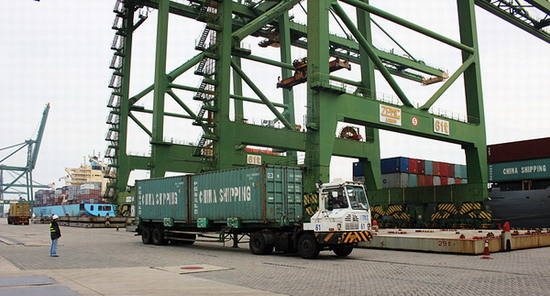

According to Yang Yimin, mayor of Fuzhou, the city is striving to become a hub city of the 21st century maritime silk road, in aspects of transportation, economic cooperation, and humanity.
 |
|
The busy and bustling Jiangyin port in Fuqing county. [Photo by Peng Juan/China Daily] |
Yang Yimin said that the city is building a perfect transportation network, involving land transport, sea transport, and air transport, to offer convenience for the transition for human flow, material flow, cash flow, and information flow.
In recent years, Wenzhou-Fuzhou Railway, Fuzhou-Xiamen Railway, and Xiangtang-Putian Railway have all been completed, and some new railway projects have been undertaken. And the city’s highway mileage reached 10,878 kilometers as of 2013, including 488 kilometers of express way, together with 275 kilometers of high-speed railway.
In terms of air transport, Fuzhou has opened up 69 domestic and eight international air routes. Fuzhou Airlines, the first airline company based in Fuzhou, officially started operations with a maiden flight to Beijing on Oct 30.
The city is also accelerating the development of its coastal harbors. Fuzhou Port owns 131 productive berths, including 45 berths with a 10,000 ton capacity , and has opened up some foreign trade shipping routes between Fuzhou and ASEAN (Association of Southeast Asian Nations) countries.
Zheng Ming, general manager of FCT Group, which operates the Jiangyin port container terminal, said the container volume of the sea routes to Southeast Asia in October had increased 65 percent year-on-year, and the number of sea routes to Africa doubled last month.
“In the future, the sea routes to Southeast Asia, Africa, and the Middle-East will be our priorities.” Zheng added.
In fact, there has always been a special bond between Fuzhou and the countries along the maritime silk road. As of 2013, ASEAN countries have invested $895 million dollars for a total of 339 projects. In 2013, the total trade volume between Fuzhou and ASEAN, the Middle-East, and Africa surpassed 6.4 billion dollars, accounting for 21 percent of the city’s total trade volume, 2.5 percent higher than the average level in China. The city government of Fuzhou signed an agreement with the China Africa Development Fund (CAD Fund) and the Fujian branch of the China Development Bank to jointly set up a fund this May. According to the plan, 10 billion yuan ($1.6 billion) will be used to support projects related to China's maritime Silk Road development. More importantly, the city has jointly applied for a Free Trade Zone with Xiamen, Pingtan, and Quanzhou, which will possibly be approved soon.
As Yang explained, the city’s government is organizing experts to study the successful experiences of Shanghai FTZ. In the meantime, it is also exploring its own distinctive mode which suits the city’s development.
Yang pointed out that the upcoming approval of FTZ will play a key role in the city’s 21st century maritime silk road strategy, because it will offer a platform for cooperation between Fuzhou with Asia-Pacific countries and ASEAN countries.
To develop the communication of humanities, the city needs to explore its historical and cultural resources. Especially, as Yang said, it should take advantage of its overseas-Chinese resources. The overall number of overseas-Chinese from Fuzhou has reached 3 million, distributing in 150 countries and districts. Especially, those living in Indonesia, Malaysia, Singapore and other Southeast Asian countries, have made great contributions to the cross-cultural exchanges between Fuzhou and countries along the silk road.
Yang added that the city government is planning to strengthen the bond between Fuzhou and the OBAOR (One Belt And One Road) countries especially Southeast Asian countries. The city’s government is also considering building an overseas-Chinese History Museum to recall their memories of hometown and improve the relationship ibetween the two sides.
Written by Peng Juan, China Daily Fujian Bureau